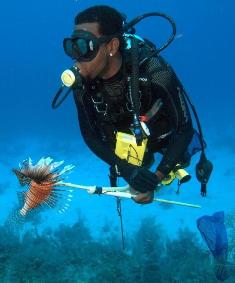DoE takes lionfish battle to Sister Islands
 (CNS): As the invasive and resilient lionfish continues its colonisation of the local reefs, the Department of Environment (DoE) is hosting another lion fish culling course, this time on Cayman Brac, next Tuesday, 28 September, to recruit more people into the battle against the recent invader. Anyone interested in helping control this invasive fish species should attend this free course to earn their lion fish culling license. The US geological survey recently revealed that this fish is the first ever non-native marine fish establishing a self-sustaining population in the region.
(CNS): As the invasive and resilient lionfish continues its colonisation of the local reefs, the Department of Environment (DoE) is hosting another lion fish culling course, this time on Cayman Brac, next Tuesday, 28 September, to recruit more people into the battle against the recent invader. Anyone interested in helping control this invasive fish species should attend this free course to earn their lion fish culling license. The US geological survey recently revealed that this fish is the first ever non-native marine fish establishing a self-sustaining population in the region.
Although other species of non-native marine fish have been sighted in the region before, until now none of these have demonstrated the ability to survive, reproduce, and spread successfully, experts have said.
“We've observed sightings of numerous non-native species, but the extent and speed with which lionfish have spread has been unprecedented," Dr Pam Schofield, a biologist with the USGS Southeast Ecological Science Center in Gainsville said earlier this year. "Lionfishes pretty much blanketed the Caribbean in three short years."
The DoE, in partnership with other local NGOs as well as dive operators, has made a concerted effort to cull the fish and local restaurants have stepped up to the plate, literally, by placing the pervasive marine creature on their menus.
Divers have also been feeding the tasty fish to larger marine inhabitants of the local waters such as grouper to encourage them to start snacking on the lionfish and help in the cull. As an invasive species, the fish, which reproduces at an alarming rate, has no natural predators in these waters, hence the need to encourage resident fish to develop a taste for them despite their noxious spines.
There are well over 300 divers currently certified to remove the fish from Cayman waters who have now removed thousands of the creatures but more hands are needed. Although the invasion of the lionfish has been described as a national emergency for the country’s reefs, especially in the Sister Islands, the DoE has stated that because action was taken in the Cayman Islands fairly early into the fish's arrival in local waters, provided the culling efforts continue, the battle to keep the numbers down to a minimum can be won.
Given the rapid spread of lionfish through the Caribbean, the goal is not to eradicate them, as experts say it would be impossible, but to reduce their population.
The course starts at 7 p.m. in the District Administration Building’s conference room. For more information call DoE at 949-8469.
Meanwhile, the Marine Conservation Boardis reminding residents of Cayman Brac and Little Cayman to renew their spear gun licenses next week. Officials will issue licenses at the Department of Environment’s office in Creek, Cayman Brac on Wednesday, 28 September from 9am to 4pm and on Thursday, 29 September, from 9 a.m. to 1 p.m. They will be on Little Cayman at the DoE office in Blossom Village on Friday, 30 September from 10 a.m. to 2 p.m.
Applicants must bring a completed application form, a police record (6 months old or less), previous spear gun license and the spear gun with all its parts. The applicant must appear in person and everyone should call 949-8469 to schedule an appointment.
A $50 application fee is payable upon issue of the license.
Category: Science and Nature


Robert Walton (I beleive in photo) has been doing a great job. He gave some lion fish to a friend a few weeks back and he had a little fry up for us. Awesome tasting fish i must admit. i'm really not excited about being stuck by this fish, but if taught how to catch or cull these safely, we have a new pass time. I like them, not as much as my buddy does and he probably not as much as Robert, but the interest is growing.
good job Robert!
That's my boy Rob! 100% in or non at all!
Shalom my friend!
The $50 application fee is ridiculous. The government should be paying the cullers. Diving ain't cheap!
Dear R.U. Kiddin,
There is NO charge for any of the licensing involved with the Lionfish Control Program implimented by the DOE. Those who are interested in Lionfish Control in the Cayman Islands and want to be active in removing this invasive species are welcome to email doe@gov.ky for more information.
Sincerely,
James Gibb – Cayman Islands Department of Environment
Wasn't it MacKeeva who gave all the Lion Fish status grants a few years back, and that's why they're taking over?
Oh wait…maybe I'm confusing this story with another one.
It's too late. Lionfish are here to stay. You can only now control its population, but that's it!